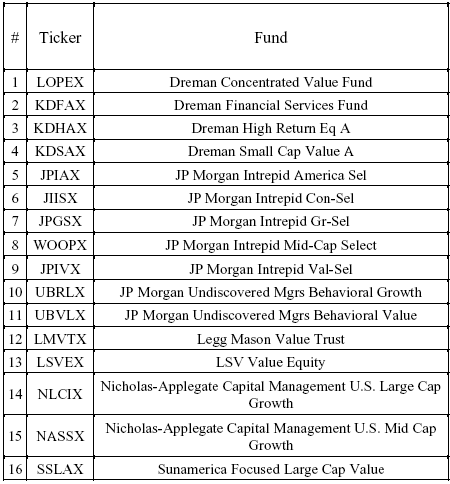Do mutual funds that implement the tenets of behavioral finance, in defiance of the Efficient Market Hypothesis, outperform? Can they find and exploit systematic behavioral mispricings? In their August 2006 paper entitled “Behavioral Finance: Are the Disciples Profiting from the Doctrine?”, Colby Wright, Prithviraj Banerjee and Vaneesha Boney assess whether expert investors have validated the principles of behavioral finance by examining the aggregate performance of a group of mutual funds that practice them. Using equal-weighted data for 16 mutual funds most visibly associated with behavioral finance (see table below), they find that:
- Mutual funds visibly espousing behavioral finance principles attract funds at a greater rate than both S&P 500 index funds and matched actively managed, non-behavioral funds.
- Based on raw returns, behavioral mutual funds generally beat both S&P 500 index funds and (less significantly) their matched non-behavioral counterparts.
- Based on risk-adjusted returns, behavioral mutual funds neither significantly outperform nor underperform their matched non-behavioral counterparts.
- Behavioral mutual funds are essentially value funds, trading the aggregate risk of value stocks for their aggregate excess raw return. There is no evidence that these funds generate excess raw returns in other ways.
- Behavioral mutual funds exhibit no ability to time risk-return opportunities.
The following table, extracted from the paper, lists the 16 mutual funds identified by the authors as most visibly associated with behavioral finance principles:

In summary, investing based on the principles of behavioral finance is indistinguishable from value investing, producing similar raw excess returns.